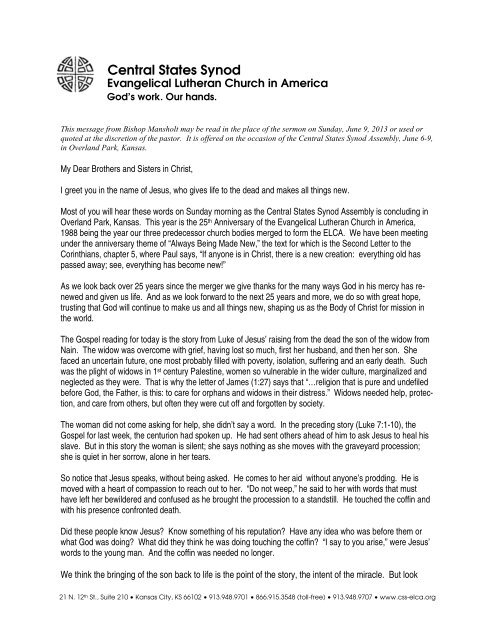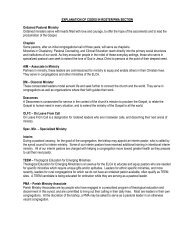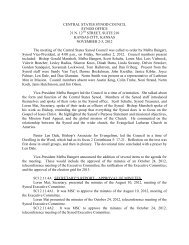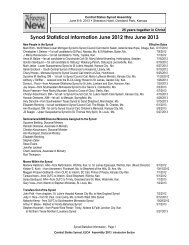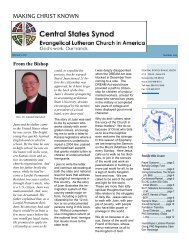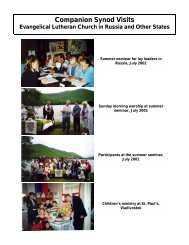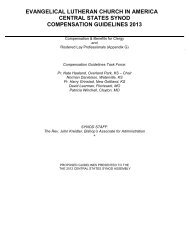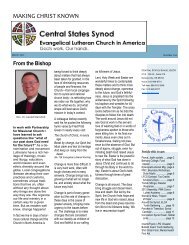Bishop's Letter - Central States Synod
Bishop's Letter - Central States Synod
Bishop's Letter - Central States Synod
You also want an ePaper? Increase the reach of your titles
YUMPU automatically turns print PDFs into web optimized ePapers that Google loves.
<strong>Central</strong> <strong>States</strong> <strong>Synod</strong><br />
Evangelical Lutheran Church in America<br />
God’s work. Our hands.<br />
This message from Bishop Mansholt may be read in the place of the sermon on Sunday, June 9, 2013 or used or<br />
quoted at the discretion of the pastor. It is offered on the occasion of the <strong>Central</strong> <strong>States</strong> <strong>Synod</strong> Assembly, June 6-9,<br />
in Overland Park, Kansas.<br />
My Dear Brothers and Sisters in Christ,<br />
I greet you in the name of Jesus, who gives life to the dead and makes all things new.<br />
Most of you will hear these words on Sunday morning as the <strong>Central</strong> <strong>States</strong> <strong>Synod</strong> Assembly is concluding in<br />
Overland Park, Kansas. This year is the 25 th Anniversary of the Evangelical Lutheran Church in America,<br />
1988 being the year our three predecessor church bodies merged to form the ELCA. We have been meeting<br />
under the anniversary theme of “Always Being Made New,” the text for which is the Second <strong>Letter</strong> to the<br />
Corinthians, chapter 5, where Paul says, “If anyone is in Christ, there is a new creation: everything old has<br />
passed away; see, everything has become new!”<br />
As we look back over 25 years since the merger we give thanks for the many ways God in his mercy has renewed<br />
and given us life. And as we look forward to the next 25 years and more, we do so with great hope,<br />
trusting that God will continue to make us and all things new, shaping us as the Body of Christ for mission in<br />
the world.<br />
The Gospel reading for today is the story from Luke of Jesus’ raising from the dead the son of the widow from<br />
Nain. The widow was overcome with grief, having lost so much, first her husband, and then her son. She<br />
faced an uncertain future, one most probably filled with poverty, isolation, suffering and an early death. Such<br />
was the plight of widows in 1 st century Palestine, women so vulnerable in the wider culture, marginalized and<br />
neglected as they were. That is why the letter of James (1:27) says that “…religion that is pure and undefiled<br />
before God, the Father, is this: to care for orphans and widows in their distress.” Widows needed help, protection,<br />
and care from others, but often they were cut off and forgotten by society.<br />
The woman did not come asking for help, she didn’t say a word. In the preceding story (Luke 7:1-10), the<br />
Gospel for last week, the centurion had spoken up. He had sent others ahead of him to ask Jesus to heal his<br />
slave. But in this story the woman is silent; she says nothing as she moves with the graveyard procession;<br />
she is quiet in her sorrow, alone in her tears.<br />
So notice that Jesus speaks, without being asked. He comes to her aid without anyone’s prodding. He is<br />
moved with a heart of compassion to reach out to her. “Do not weep,” he said to her with words that must<br />
have left her bewildered and confused as he brought the procession to a standstill. He touched the coffin and<br />
with his presence confronted death.<br />
Did these people know Jesus Know something of his reputation Have any idea who was before them or<br />
what God was doing What did they think he was doing touching the coffin “I say to you arise,” were Jesus’<br />
words to the young man. And the coffin was needed no longer.<br />
We think the bringing of the son back to life is the point of the story, the intent of the miracle. But look<br />
21 N. 12 th St., Suite 210 • Kansas City, KS 66102 • 913.948.9701 • 866.915.3548 (toll-free) • 913.948.9707 • www.css-elca.org
what Jesus did next. Jesus returned the son to his mother. I imagine Jesus looking the woman in the eyes,<br />
perhaps shedding tears as her life is made new, as he reunites mother and son, and restores her to a life in<br />
community with others. The miracle is more than we thought at first. The life Jesus brings is both in raising<br />
the son to life and in restoring the woman to a life of dignity and community.<br />
As God wraps this story around our hearts and minds this day, I hear the Word of God offering us the Promise<br />
of healing and life restored, or, in the words of the 25 th Anniversary theme, God promises to keep making all<br />
things new.<br />
In the wake of the devastating tornado in Moore, Oklahoma we are reminded once again of the fragility of all of<br />
life. But while death and destruction do come, and the sorrow and loss is great, the final word belongs to God.<br />
In two weeks I will be with Peace Lutheran Church in Joplin, Missouri as they dedicate their new church building,<br />
the old one destroyed two years ago with so much of the community and neighborhood around them.<br />
While we grieve in the face of death and struggle with the challenges to rebuild our lives and communities, we<br />
have the Promise of God who raised Jesus from the dead and makes all things new.<br />
I often hear members and leaders from our congregations ask what can be done to help the congregation to<br />
grow, to find some energy, life and direction. Many of our congregations are feeling life drained from them as<br />
membership dwindles and people are absent from worship. We may be depressed over declining numbers in<br />
church life, even fearful of what lies in the future. The tendency is to circle the wagons in fear and protect what<br />
little we have left. In an effort to preserve what life we have, we isolate ourselves as we preserve the past.<br />
We cease to see the gifts God has given us and grow timid in our witness and service.<br />
Can we see ourselves lying in the coffin, carried by others Can we see ourselves in the procession toward<br />
death and hear the voice of Jesus addressed to us. “Do not weep,” he says with compassion. “Arise, I give<br />
you life,” he says to you and to me, and all of us in our life together in the <strong>Central</strong> <strong>States</strong> <strong>Synod</strong>.<br />
This is the Christ who tasted death himself, who went to the grave for your sin and mine. This is Jesus whom<br />
God raised from the dead for our life and salvation. This is the One of whom Paul said: “If anyone is in Christ,<br />
there is a new creation. Everything old has passed away; see, everything has been made new.”<br />
I invite and encourage everyone in the synod to spend time in these words, in this Promise of God. In this<br />
Holy and Triune God, Father, Son and Holy Spirit, we are Always Being Made New. So take time to sit in<br />
silence, open yourself to the presence of God and the power of the Spirit, and receive the life God alone gives.<br />
Here is where renewal begins for all us—for your life personally, for the life of your congregation, for our life as<br />
a synod in the Evangelical Lutheran Church in America. Here is where hope and healing begins for a world in<br />
the grips of death and self-destruction.<br />
Today God has given us this powerful word of Jesus, who with a heart of deep compassion gives life to a<br />
widow and her son. And to we who pray, who open ourselves to his presence and promise, God still gives life<br />
and makes all things new.<br />
Thanks be to God!<br />
Bishop Gerald Mansholt<br />
<strong>Central</strong> <strong>States</strong> <strong>Synod</strong>


